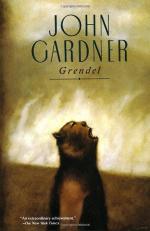|
|
Grendel Topic Tracking: Human/Animal
Chapter 1
Human/Animal 1: Grendel sets himself apart from his mother, who cannot speak and, according to him, does not think coherently. He believes he is above her, and the animals that live near his cave. He seems to think of men as like him: he knows they are thoughtful, like he is. However, he also knows that he has animal urges: when he gets hungry, he needs blood, whether he wants it or not.
Chapter 2
Human/Animal 2: Grendel thinks of himself as more of a civilized, thoughtful creature than he used to be. When he was younger, he was curious, and as frisky as a puppy. He felt closer to his mother then. Now, he is isolated, and cynically thoughtful.
Human/Animal 3: While the men see Grendel as less than even a mammal--a fungus--Grendel sees the men as less than human. He thinks of them like rats, and understands their language better than they understand his. Yet he also fears them, because he can see that, unlike animals, men can think and plan on a complex level.
Chapter 3
Human/Animal 4: The men are becoming more "human," and less part of the wildlife of the land. They build roads and towns, frighten away the animals, and destroy the landscape. Though Grendel is interested in them, he is both more animal (he is a solitary hunter) and more humane (he is disgusted with the way the men treat their environment.)
Human/Animal 5: Grendel tries to fight the ultimate form of humanity--the songs of the Shaper--by screaming like an animal. Still, the civilized idea of culture is very appealing to him. He cannot shut it out with his savage behavior.
Chapter 4
Human/Animal 6: Grendel sees the animal cruelty the Danes are capable of when he finds the corpse outside the village. He contrasts it cynically with the pious, cultured songs the Shaper sings. Still, however, he is drawn to the Danes' civilization. He wants to be a part of it, even if he has to play the role of Evil.
Chapter 7
Human/Animal 7: Grendel continues to try to combine his two warring natures. He thinks of the men as part of his life: they all give each other a reason to live. And he feels for Wealtheow in much the same way the Danes do. Yet he cannot accept these feelings. He thinks they are weak and irrational, and hates himself for giving in to them. He reminds himself that life is pointless, and tries to get excited about eating people.
Chapter 9
Human/Animal 8: Grendel highlights what he believes to be the animal nature of ritual. The priests, when praying, use a language similar to Grendel's. This is striking in light of how often Grendel equates ability to speak with intelligence and sophistication (he hates his mother because she has no language, and he shocks Unferth when he speaks to him). The townspeople rebuilt the holy place when Grendel destroyed it, he says, in an instinctual way. They did so not because they cared about their religion, but because it seemed vaguely like something they had to do.
Human/Animal 9: Grendel sees, in spite of himself, that Ork transcends the ritual prayers and the often brutal life of the Danes. He does so by thinking, by trying to understand God and do what He wants. Ork claims that his life goal has been achieved: he has spoken with the King of the Gods. The dragon had almost convinced Grendel that one goal was as good as another, but Grendel sees that Ork's goal was really worth something: it made him think and gave him joy. Grendel, who has always believed that there is no God, is disturbed to see that this intelligent, kindly man believes with all his heart. Feeling threatened and losing his appetite, Grendel backs away.
Chapter 10
Human/Animal 10: Grendel feels closer than ever to Hrothgar after the Shaper dies. He recognizes that part of what separated them was the Shaper's ability to make events seem meaningful: he had a masterful command of language. Hrothgar, who rarely speaks, needed the Shaper to make his people loyal and his kingdom strong. Without the Shaper between them, Grendel and Hrothgar are two sides of the same coin. The differences between man and monster fade away.




